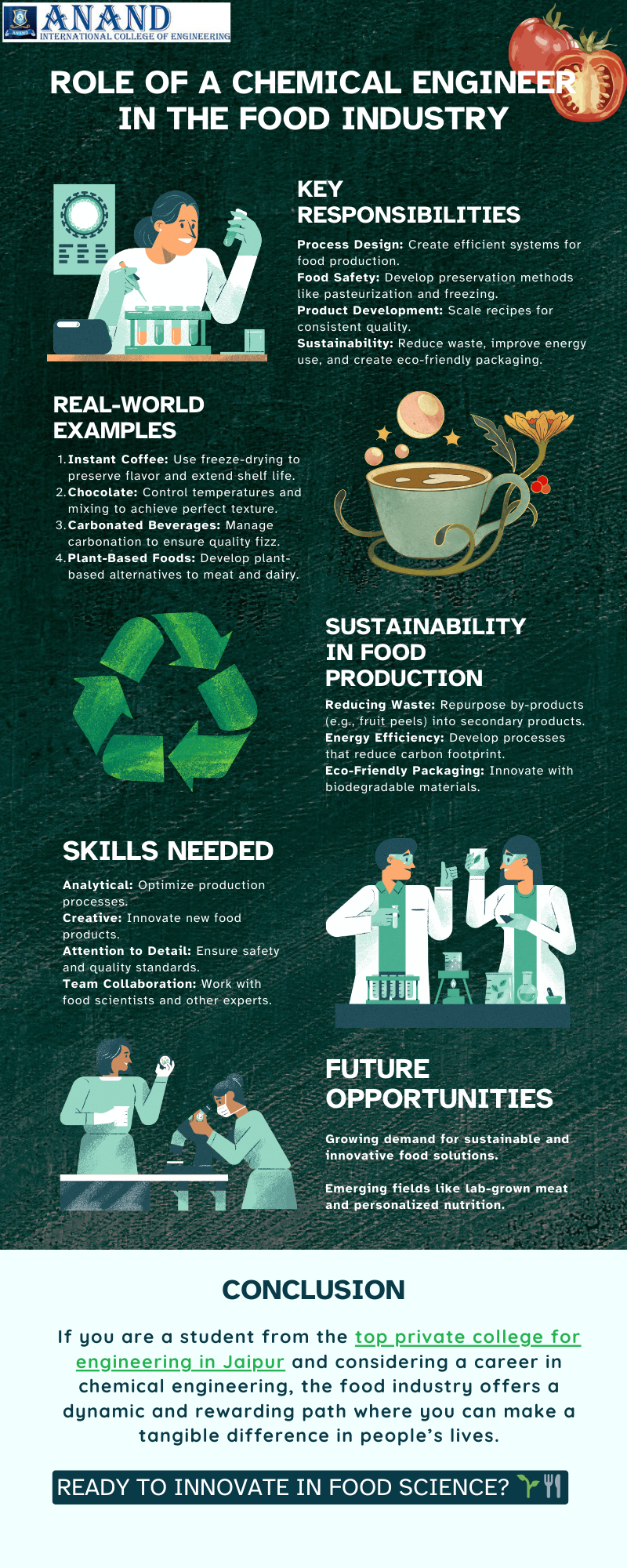When we think of chemical engineering our minds often drift to oil refineries, chemical plants or pharmaceutical labs. However one of the most fascinating, impactful and lesser-known applications of chemical engineering is in the food industry. This vibrant field is where science, engineering and culinary art converge to ensure that the food we eat is safe, nutritious, affordable and delicious.
In this article for the students of top private college for engineering in Jaipur we will explore the pivotal role of chemical engineers in the food industry, their responsibilities and how they contribute to innovation and sustainability in one of the most essential sectors of human life.
What Does a Chemical Engineer Bring to the Food Industry?
Chemical engineers apply principles of chemistry, physics, biology and mathematics to solve problems related to the production and use of chemicals, materials and energy. In the food industry they use their expertise to design and optimize processes for producing, packaging and preserving food. Their work spans various areas:
- Process Design and Optimization
Chemical engineers design efficient systems to convert raw agricultural products into processed food items. This includes creating processes for large-scale production of items like canned goods, dairy products and beverages. They ensure these processes are not only efficient but also meet stringent safety and quality standards. - Food Safety and Preservation
Chemical engineers play a vital role in developing methods to extend the shelf life of food products. They work on processes like pasteurization, sterilization, freezing and vacuum packaging to prevent spoilage and maintain nutritional value. - Product Development
Ever wondered how your favorite snack maintains the same taste and texture every time? Chemical engineers collaborate with food scientists to develop recipes that are scalable for mass production. They experiment with ingredients, temperatures and processes to achieve consistent quality. - Sustainability in Food Production
Chemical engineers are at the forefront of making food production sustainable as the concerns about environmental impact are growing. They work on reducing waste, improving energy efficiency and developing biodegradable packaging materials.
Key Responsibilities of Chemical Engineers in the Food Industry
1. Raw Material Analysis and Sourcing
Chemical engineers evaluate the properties of raw materials to determine their suitability for food production. For example they analyze the chemical composition of wheat for flour production or assess the fat content in milk for dairy products. This analysis ensures that the end product meets desired quality standards.
2. Scaling Up Production
Transitioning from a small kitchen recipe to a production line capable of producing thousands of units per hour is no small feat. Chemical engineers design processes that replicate the original recipe on a much larger scale while maintaining quality and minimizing costs.
3. Quality Control and Assurance
Ensuring the consistency of food products is critical in the food industry. Chemical engineers develop protocols for testing parameters like pH levels, moisture content and shelf stability. They also oversee compliance with food safety regulations.
4. Developing New Technologies
Chemical engineers innovate by developing technologies like spray drying for powdered food products or extrusion processes for snacks like pasta and chips. These advancements not only improve efficiency but also open up possibilities for new food products.
Real-World Examples of Chemical Engineering in Food
- Instant Coffee Production
Instant coffee is a staple in many households but creating it requires advanced chemical engineering. Engineers design processes for freeze-drying or spray-drying coffee extract to preserve flavor and aroma while extending shelf life. - Chocolate Manufacturing
From sourcing cocoa beans to producing silky chocolate bars, chemical engineers are involved in every step. They ensure the right temperatures and mixing speeds are maintained for that perfect melt-in-your-mouth texture. - Carbonated Beverages
The fizz in your soda is the result of precise carbonation processes. Chemical engineers develop systems to infuse the right amount of carbon dioxide while maintaining the beverage’s flavor and safety. - Plant-Based Foods
Chemical engineers are helping create products that mimic the taste and texture of meat and dairy as the demand for vegan and plant-based alternatives is growing . This involves using advanced processes to extract proteins from plants and blend them with other ingredients.
The Growing Importance of Sustainability
Sustainability has become a cornerstone of the modern food industry and chemical engineers are leading the charge. They are working on:
- Reducing Food Waste: Designing processes that utilize by-products like fruit peels and seeds for secondary products.
- Energy Efficiency: Developing energy-efficient equipment and processes to reduce the carbon footprint of food production.
- Eco-Friendly Packaging: Creating biodegradable and compostable packaging materials to replace plastic.
Skills Required for Chemical Engineers in the Food Industry
To excel in the food industry chemical engineers need a blend of technical and soft skills:
- Strong Analytical Skills: To analyze complex processes and identify areas for improvement.
- Creativity: To innovate and develop new food products and technologies.
- Attention to Detail: To ensure safety and quality standards are met.
- Team Collaboration: To work effectively with food scientists, technologists and marketing teams.
Opportunities and Future Prospects
The food industry offers diverse career opportunities for chemical engineers. They can work in production plants, research and development labs or quality assurance teams. With the rise of health-conscious and environmentally aware consumers, the demand for skilled professionals who can innovate while adhering to sustainability standards is on the rise.
Emerging trends like lab-grown meat, personalized nutrition and smart packaging further expand the horizons for chemical engineers in this field.
Conclusion
Chemical engineers are an integral part of the food industry who ensure that the food we consume is safe, nutritious and sustainable. Their expertise bridges the gap between raw agricultural products and the final packaged goods on supermarket shelves. The role of chemical engineers in shaping a sustainable food future becomes even more critical as the world continues to face challenges like population growth and climate change.
If you are a student from the top college for engineering in Rajasthan and considering a career in chemical engineering, the food industry offers a dynamic and rewarding path where you can make a tangible difference in people’s lives. So the next time you enjoy your favorite snack or beverage take a moment to appreciate the intricate engineering processes that made it possible.


